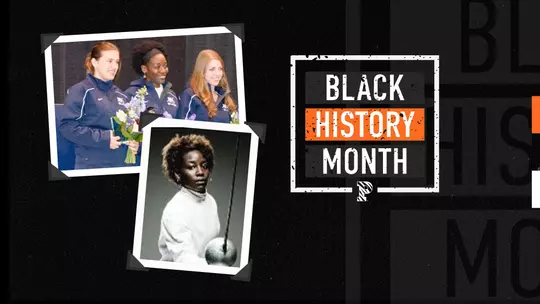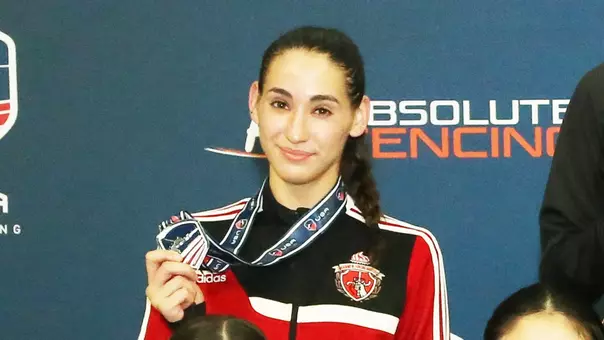
Maya Lawrence '02 - From The Brink To Bronze
2/18/2021
Maya Lawrence had a rather random introduction to the sport in which she would eventually earn an Olympic bronze medal.
“My friends came to the lunch table and said they were joining the fencing team,” Maya Lawrence says from her house in France. “I said ‘okay. I’ll do it too.’ That’s how it started.”
To that point, she had been a softball player. She started out playing baseball when she was 5 and moved over to softball at one point. She also played a little basketball.
“Those were the only two team sports I ever played,” she says. “I played for fun. I wasn’t great. I was decent enough that I could play and not worry about extra training or wanting to go to summer camps or travel teams.”
Her introduction to fencing came at Teaneck High School, where her mom is now the coach.
Like her daughter, Maya’s mother had no idea what fencing was all about until the friends came back to the lunch table that day. She’d go on to coach, and to compete in senior tournaments, including over-65 and later over-70 divisions.
Before Lawrence’s mother became the coach, the team at Teaneck was under the direction of essentially whoever would be willing to do it. At first it was the drama teacher. Then it became the volleyball coach.
Regardless of the coach, Lawrence took to the sport immediately. For starters, she was better at it than she’d been at softball. She made the varsity on her first try, and within a year she was competing for a local club team, first in local tournaments and then working her way up to the state and national level.
“I’m very good at following directions,” she says. “Fencing is almost a military type of sport. You have to repeat things over and over and over and over. A lot of it is muscle memory and repetition. Even when I was younger, I was decent at that. The coaches told me what to do, and I did it. Whatever training was thrown at me, I wanted to be good at it.”
When it came time to choose a college, her mom suggested applying to Princeton, which was counter to her desire to get out of New Jersey. To appease her parents, she filled out the application and was accepted. She was not a recruited fencer.
The girls who were recruited were some of the best in the country,” she says. “I thought it could be a good place for me. If I had to sit on the bench, I was okay with that.Maya Lawrence
Instead, she earned a spot in the Princeton lineup immediately. By the time she graduated in 2002, she was a four-time NCAA qualifier and four-time All-Ivy League selection, including three first-team honors.
Once she graduated, she decided to devote herself fully to the sport, with the goal of the Olympics always in her mind.
“I just didn’t realize how many cycles it would take to get there,” she says. “Each year from when I started training, I wanted to go to the next Olympics. I wanted to go to Sydney. Then to Athens. Then to Beijing. They didn’t work out. To be honest, the two were long shots, but each time I got a little closer.”
She began her post-college training with Michel Sebastiani, her coach at Princeton, while she taught at Princeton Day School. She would also train in New York City, but she quickly figured out that her best bet would be to head to Europe to train there.
Her first task was to learn French. Her next was to compete with some of the top fencers in the world at the club at which she would be training.
“To be a great fencer, you need strength and decent agility,” she says. “You need to know how to deal with tough situations. When you get to a certain level, you have to be willing to train every day. But the best fencer in the world is not athletically the same as the fastest person in the world. What you need most is stubbornness. Stubbornness. A lot of the best fencers are really good at losing and then continuing on. No fencer wins every competition all the time. In tennis, the stars in the last 10 years win competitions regularly. Fencing is the kind of sport where you can lose early or win a competition. That’s especially true in women’s epee.”
Her stubbornness is what got her through. Her stubbornness is what allowed her to relocate to a different continent. Her stubbornness is what made keeping her eye on the big picture of a spot in the Olympics when she faced setback after setback.
“I don’t know how many World Cups I’ve been to,” she says. “I’ve never won. I’ve never won a Grand Prix. It’s not like I went to competitions and came back with medals all the time. At some point, maybe your logical brain tells you it doesn’t make sense to keep going, but your emotional brain tells you to be stubborn and not give up. It tells you to keep chasing this thing, even if you may never get it. That’s the skill all good fencers have to have.”
She came close in 2008, agonizingly close. The qualifying process can be complex, determined by your national ranking within your country and your country’s ranking in the world. She was fencing the best she ever had, and she was right on the line between making the Olympics and not making them.
Instead, in a crucial match against her Hungarian opponent, she had the lead with only five seconds remaining. Five seconds. Had she won that match and then one more after that, she probably would have been on the team for Beijing.
“She lunged at me and I went to block her,” Lawrence says. “And I tore my ACL. I wanted to stand up and keep fencing. There were only three seconds to go. But I couldn’t. I had to withdraw. I had to fly back to Paris that night. It was physically excruciating, and it was emotionally crushing. I kept playing the replay over and over in my head for years.”
Was there any chance that the injury would be the end of her career?
“When I told my group that I trained with in Paris what had happened, their reaction was ‘okay, see you at practice Monday.’ The injury didn’t have any bearing on whether I’d keep fencing. Why would I consider stopping? The idea didn’t make sense to them. It wasn’t even a question.”
Lawrence went through surgery to fix her knee and came back in eight months, in January 2009. The next Olympics were more than three years away.
In her first competition, with 10 seconds left … she tore her other ACL.
“I knew what was ahead of me,” she says. “I knew how long it would take. The coach said I’d actually picked the right time to get injured, and he was right. He was very forward-thinking. In the end, it was good for me to get a break in between the two Olympic cycles that I otherwise wouldn’t have. It gave me the stamina to keep going.”
By 2012 she was back on top of her game. In the old existing Olympic rule, there were individual competitions in all three weapons but only one team event. In 2012, it happened to be in the epee.
When she found out she’d made the team, it was a mix of elation with a bittersweet side. She and fellow Princetonian Susie Scanlan had made the team, but when she moved into the top four spots for the epee team, it pushed her Princeton teammate Lindsay Campbell off of the team.
The Olympic experience is like nothing else any athlete will ever experience in any other way. It’s a huge honor to be there representing your country. It’s a huge party, with athletes from all over the world in every imaginable sport.
Lawrence was awestruck by the Opening Ceremonies, and she and Scanlan both loved the interactions with the other athletes, including a chance dining hall meeting with swimmer Ryan Lochte. They took hundreds of pictures.
Of course, it was also a business trip. For Lawrence, the travel wasn’t bad at all, since she was living full-time in France already.
Lawrence and Scanlan both fenced in the individual round prior to the team event, and Lawrence advanced to the second round but neither came close to a medal. There were eight countries in the team competition, and the U.S. team consisted of the two Princetonians and the two Hurley sisters. The rules said that only three of the four team members would compete in any given match, though which three competed could change from match to match.
The U.S. defeated Italy in the first round to reach the semifinals, where the Americans lost to South Korea. This set up a match against Russia, who had been the gold medal favorite, for the bronze.
“At some point I knew it was possible,” Lawrence says. “The score was really close. They’d always beaten us handily., we were able to keep ourselves ahead the whole time. In the end, I was shocked. Excited and happy and shocked.”
Lawrence is still in France. She no longer fences either, but she also has learned lessons that will stay with her forever.
Sometimes when I think about it, I know I got where I did purely because of hard work,” she says. “I’m not super athletic. I don’t have innate physical skills. I’m hard-headed. You have to practice and practice and practice more. You have to convince yourself the world is against you and you have to keep trying and trying anyway. You have to trick yourself that there’s a conspiracy against you. If you think about it logically, you go to 50 competitions and never win. Why would you think you’ll win the next one? Why would you keep going? But you do.Maya Lawrence
It paid off for her. She speaks about the journey she took, the injuries and uncertainties along the way, the lessons that were taught. That’s what is now forever burned inside her.
And, of course, there is the medal itself. The medal ceremony was another moment of extreme elation. As she talks about it, she does so with equal parts pride, satisfaction and joy, with a mixture of relief and even perhaps, for a moment, the slightest hint that she still doesn’t believe she did it.




